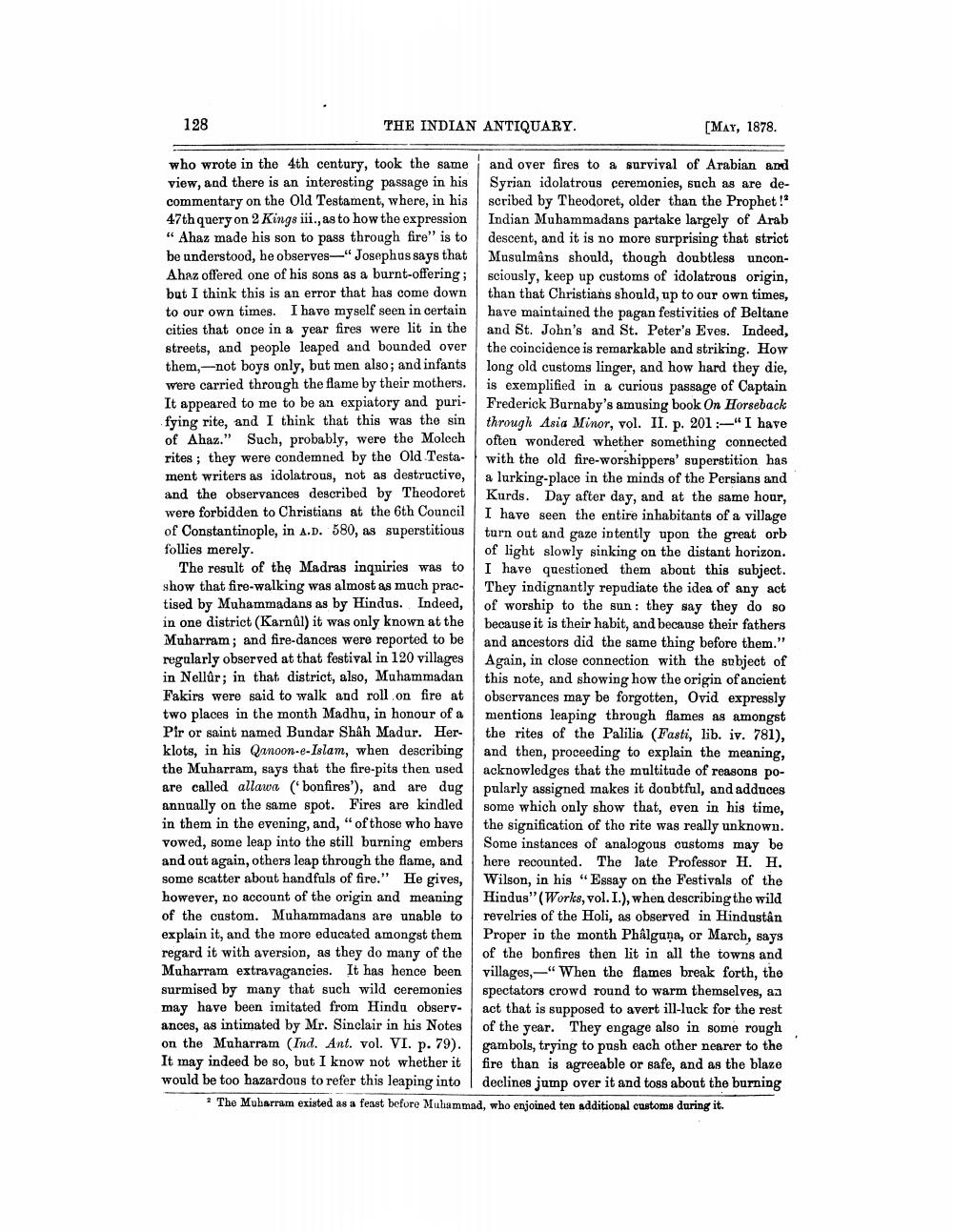________________
128
THE INDIAN ANTIQUARY.
[MAY, 1878.
who wrote in the 4th century, took the same and over fires to a survival of Arabian and view, and there is an interesting passage in his Syrian idolatrous ceremonies, such as are decommentary on the Old Testament, where, in his scribed by Theodoret, older than the Prophet! 47th query on 2 Kings iii., as to how the expression Indian Muhammadans partake largely of Arab "Ahaz made his son to pass through fire" is to descent, and it is no more surprising that strict be understood, he observes-" Josephus says that Musulmans should, though doubtless unconAhaz offered one of his sons as a burnt-offering; sciously, keep up customs of idolatrous origin, but I think this is an error that has come down than that Christians should, up to our own times, to our own times. I have myself seen in certain have maintained the pagan festivities of Beltane cities that once in a year fires were lit in the and St. John's and St. Peter's Eves. Indeed, streets, and people leaped and bounded over the coincidence is remarkable and strikino them, -not boys only, but men also; and infants long old customs linger, and how hard they die, were carried through the flame by their mothers. is exemplified in a curious passage of Captain It appeared to me to be an expiatory and puri. Frederick Burnaby's amusing book On Horseback fying rite, and I think that this was the sin through Asia Minor, vol. II. p. 2012"I have of Ahaz." Such, probably, were the Molech often wondered whether something connected rites; they were condemned by the Old Testa- with the old fire-worshippers' superstition has ment writers as idolatrous, not as destructive, a lurking-place in the minds of the Persians and and the observances described by Theodoret Kurds. Day after day, and at the same hour, were forbidden to Christians at the 6th Council I have seen the entire inhabitants of a village of Constantinople, in A.D. 580, as superstitious turn out and gaze intently upon the great orb follies merely.
of light slowly sinking on the distant horizon. The result of the Madras inquiries was to I have questioned them about this subject. show that fire-walking was almost as much prac- They indignantly repudiate the idea of any act tised by Muhammadans as by Hindus. Indeed, of worship to the sun : they say they do so in one district (Karnal) it was only known at the because it is their habit, and because their fathers Muharram; and fire-dances were reported to be and ancestors did the same thing before them." regularly observed at that festival in 120 villages Again, in close connection with the subject of in Nellur; in that district, also, Muhammadan this note, and showing how the origin of ancient Fakirs were said to walk and roll on fire at observances may be forgotten, Ovid expressly two places in the month Madhu, in honour of a mentions leaping through flames as amongst Pir or saint named Bandar Shah Madur. Her the rites of the Palilia (Fasti, lib. iv. 781), klots, in his Qanoon-e-Islam, when describing and then, proceeding to explain the meaning, the Muharram, says that the fire-pits then used acknowledges that the multitude of reasons poare called allawa ( bonfires'), and are dug pularly assigned makes it doubtful, and adduces annually on the same spot. Fires are kindled some which only show that, even in his time, in them in the evening, and," of those who have the signification of the rite was really unknown. vowed, some leap into the still burning embers Some instances of analogous customs may be and out again, others leap through the flame, and here recounted. The late Professor H. H. some scatter about handfuls of fire." He gives, Wilson, in his “Essay on the Festivals of the however, no account of the origin and meaning Hindus"(Works, vol. I.), when describing the wild of the custom. Muhammadans are unable to revelries of the Holi, as observed in Hindustan explain it, and the more educated amongst them Proper in the month Phálgana, or March, says regard it with aversion, as they do many of the of the bonfires then lit in all the towns and Muharram extravagancies. It has hence been villages, -"When the flames break forth, the surmised by many that such wild ceremonies spectators crowd round to warm themselves, an may have been imitated from Hindu obsery act that is supposed to avert ill-luck for the rest ances, as intimated by Mr. Sinclair in his Notes of the year. They engage also in some rough on the Muharram (Ind. Ant. vol. VI. p. 79). gambols, trying to push each other nearer to the It may indeed be so, but I know not whether it fire than is agreeable or safe, and as the blaze would be too hazardous to refer this leaping into declines jump over it and toss about the burning
+ The Muharram existed as a feast before Muhammad, who enjoined ten additional customs during it.




